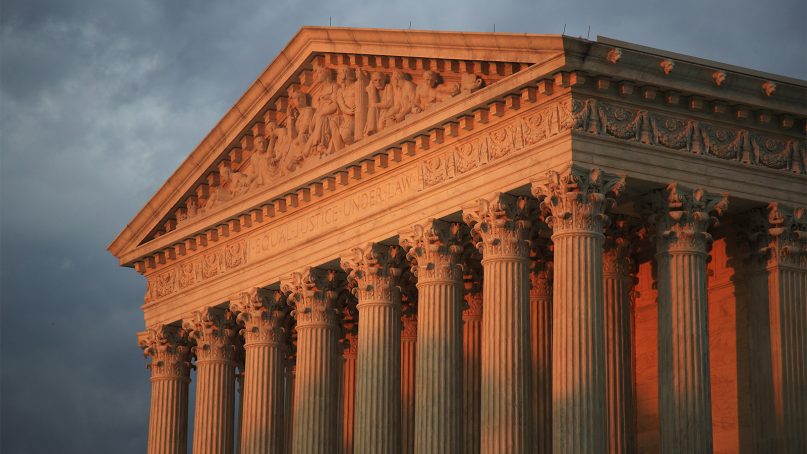(RNS) — Last Friday (April 9), the Supreme Court granted an injunction to exempt home Bible studies from a California COVID-19 rule that limits in-home gatherings to three families. This is the latest in a series of 5-4 decisions since Amy Coney Barrett joined the court in October that permit religious free exercise to trump state COVID-19 restrictions.
What the latest decision, Tandon v. Newsom, makes clear is that the court’s determinedly pro-religion conservative wing has found a way to neuter, without actually reversing, its 1990 Smith decision. That’s the one where the late Justice Antonin Scalia persuaded four colleagues to agree that free exercise claims cannot be made against “neutral, generally applicable law.”
Let me explain.
In Smith, the court was faced with two members of the Native American Church who had been fired for violating an Oregon law prohibiting drug counselors from taking drugs. They contended that because their religion used peyote as a sacrament, they had a free exercise right to partake of that drug and so were entitled to unemployment benefits.
The court rejected the plaintiffs’ claim that, in Scalia’s words, “when otherwise prohibitable conduct is accompanied by religious convictions, not only the convictions but the conduct itself must be free from governmental regulation.” Harking back to Reynolds v. United States (1878), the court’s famous anti-polygamy decision, Scalia insisted that while religious beliefs and their communication could not be regulated by government, religious conduct could.
Three years later, in Lukumi Babalu Aye v. Hialeah, the court set out rules for determining when the free exercise clause could succeed in prohibiting the government from regulating religious conduct. The case involved the claim of a Santeria church against several ordinances prohibiting animal sacrifice passed by the City of Hialeah, Florida.
Employing the Smith criteria, the court ruled that the ordinances were not neutral because they “have as their object the suppression of Santeria’s central element, animal sacrifice” and were not generally applicable because each “pursues the city’s governmental interests only against conduct motivated by religious belief.”
Because they lacked neutrality and general applicability, the court required the Hialeah ordinances to pass the legal test of “strict scrutiny,” which requires that a law advance a “compelling” government interest by the “least restrictive means.” And, it found, the ordinances flunked the test.
Now, you’d think that California’s three-family-in-a-home COVID rule would have no trouble satisfying the Lukumi Babalu Aye standard. As the state’s brief put it, “That policy is entirely neutral toward religion; it applies to gatherings for any purpose — secular or religious.”
So how did the court justify its injunction?
First, it determined that the rule is not neutral and generally applicable because the state permits more than three families to show up at such “comparable secular activities” as hair salons, retail stores, personal care services, movie theaters, private suites at sporting events and concerts and indoor restaurants.
Then it suggested that the state’s argument for needing to impose the restriction is less than compelling.
No evidence was brought forward to suggest that the rule has as its object the suppression of at-home Bible studies or that it is being pursued only against conduct motivated by religious belief. Arguably, the state had no idea it was impinging on a religious practice when it instituted the rule.
The effect of this ruling is to reestablish the strict scrutiny test whenever the court feels like doing so.
Take the original Smith case. Like peyote, alcohol is an intoxicant that can impair the ability of drug counselors to do their work. By making peyote consumption but not alcohol consumption a firing offense, Oregon’s drug law is not neutral and generally applicable, no matter that the state had no idea when it passed the law that it was impinging on a religious practice.
You may find this a lousy argument. After all, peyote is an illegal drug, while alcohol is legal.
But that’s just the point. A court bent on finding an absence of neutrality can always find something. Just because home gatherings to watch the Super Bowl are treated the same as home gatherings for Bible study doesn’t mean that some other secular gatherings that are given more leeway can’t be deemed comparable.
As the ruling says, “(G)overnment regulations are not neutral and generally applicable, and therefore trigger strict scrutiny under the Free Exercise Clause, whenever they treat any comparable secular activity more favorably than religious exercise.” Any, get it?
And if, in addition, a government intent to harm free exercise does not have to be proven, then Smith becomes a dead letter — except for one thing. Now the court can pick and choose when it wants strict scrutiny to apply and when a “neutral, generally applicable law” can be used to keep a plaintiff out of court.






